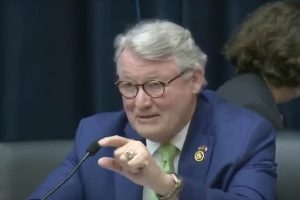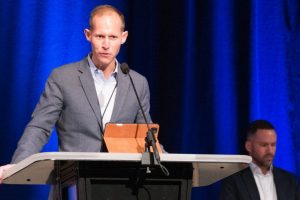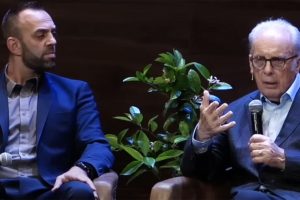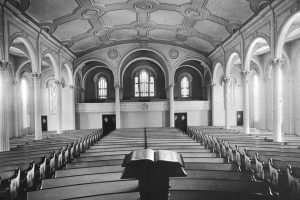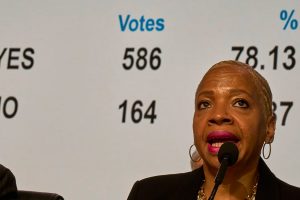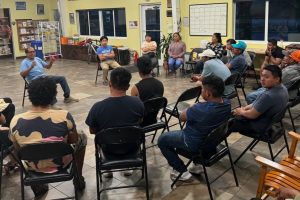I haven’t attended church in almost four years and can’t imagine going back.
I don’t share this lightly. I was so dedicated to the church that I structured my entire career spanning two decades cleaning restrooms and floors in order to have the flexibility to volunteer many hours each week in church planting, worship leading, Bible studies and other ministries. And I did so out of gratitude for the gospel rather than to earn my standing with God.
Even as my theology deconstructed and after I eventually left, I went into tens of thousands of dollars of student debt pursuing a master’s degree in worship as part of my personal processing of what happened. And I don’t regret a single penny of it.
But now I’m part of the “never attenders.”
The “never attenders” go to church even less than what some call the “Chreasters” — those who attend only at Christmas and Easter. We simply never attend.
For many of my fellow “never attenders,” our decision to leave happened during the Trump presidency, despite many of us being members of churches that didn’t explicitly bend the knee to the former president.
“Did the election of Donald Trump drive people from the pews?”
So how widespread is this phenomenon of “never attenders”? How quickly is this trend growing? And is it really simply about politics? Or as Ryan Burge, a political scientist and Baptist pastor recently asked: “Did the election of Donald Trump drive people from the pews?”
Measuring the ‘never attenders’ by age
Burge studied data from the Cooperative Election Study and saw that every age group has trended toward an increase in those who never attend church.
“For folks born in the early 1950s, 16% were never attenders in 2008,” he noted. “That’s nearly doubled to 30% today.”
Additionally, among those who were born in the 1980s, 25% were “never attenders” in 2008, compared to 36% today.
The baseline percentage in 2008 goes up the younger people are as well. For example, 15% of those who were born in the late 1930s were “never attenders” in 2008, compared to 25% of those who were born in the early 1990s. So over time, it should be expected that these trends will increase even more.
Measuring the ‘never attenders’ by political affiliation
Across the age groups, Burge discovered Democrats are twice as likely as Republicans (42% to 21%) to report never attending church in 2020.
But what’s even more interesting is how the rate increase of people never attending church rose exponentially during the Trump administration compared to the rate increase during the Obama presidency.
“The rate increase of people never attending church rose exponentially during the Trump administration compared to the rate increase during the Obama presidency.”
“For those born between 1975 and 1979, the never attenders rose 3% between 2010 and 2016,” Burge explained. “The share of never attenders rose 16% between 2016 and 2022.”
Contrasting partisan differences
Focusing in on the potential Trump effect from 2016 to 2022, one of the most striking results is seeing how Republicans remained relatively static while Democrats increased dramatically in having no religious affiliation.
The only exception to this rule was Gen Z Republicans, who increased in non-religious status from 21% in 2016 to 28% in 2022. Other than that, Republican Millennials remained at 25% throughout that time frame, Gen X held steady at 20%, Boomers were consistent at 14%, and the Silent Generation increased slightly from 7% to 9%.
But in contrast to the steady consistency of Republicans across each of these generations, the Democrats who identified as non-religious increased between 4% to 11% from 2016 through 2022.
According to Burge, “Social behavior doesn’t just change that quickly, unless there is a methodological change or some kind of exogenous shock.”
“Social behavior doesn’t just change that quickly, unless there is a methodological change or some kind of exogenous shock.”
After ruling out a number of possibilities, Burge concludes, “The only other logical explanation in my mind is Donald Trump.”
Is religious deconstruction simply changing political parties?
Burge believes that “people are picking their religion based on their politics, not their politics based on their religion. That means that moderates and liberals are feeling less and less welcome in evangelical churches and are heading to the exits, never to return.”
Richard Beck, a professor at Abilene Christian University and Fuller Theological Seminary, makes a similar point. Although he prefaces his conclusion by saying he doesn’t “want to paint with too broad a brush,” that deconstruction is necessary, and that he “sides more with woke, social justice warrior Christians,” he suggests that “people are just being angsty about changing political parties, describing a political change as a religious journey.”
Beck asks: “When someone says they’ve ‘deconstructed’ their faith, was the outcome of that journey that were raised a Republican and are now a Democrat? If so, I don’t think we’ve witnessed a true deconstruction. That person just changed political parties.”
The politics of incompatibility
“If what we are witnessing were truly deconstruction, real dark night of the soul journeys, we’d see a whole lot more people landing in strange, peculiar and hard-to-define political locations,” Beck writes. “We’d see evidence of the Holy Spirit blowing people around unpredictably (i.e., not neatly captured by the confines of a two-party political system) rather than people simply shifting from one voting bloc to another.”
Of course, I have not conducted any peer-reviewed interviews or research projects. So much of my experience may be considered anecdotal. But I’m well connected with many people who have deconstructed their previous beliefs and no longer attend church. And for many of us, the journey has been a deeply spiritual process of awareness and healing that opened us up to love our neighbors as ourselves by participating with them in their liberation.
“It’s not that we think the Democrats embody this vision well. But it’s that the GOP’s platform is incompatible with union, belonging and liberation.”
Theologically, scientifically and spiritually, many of us have journeyed toward a space of union, belonging and liberation toward a more holistic creative union. And for those I’ve talked with, it’s not that we think the Democrats embody this vision well. But it’s that the GOP’s platform is incompatible with union, belonging and liberation.
Christian nationalists and supremacists are using the Republican power structure to advance their theological and spiritual warfare against their neighbors. The right has become a highly individualized alternate reality where justice is defined as violent retribution against human bodies, where scientific consensus is demonized, and where self-awareness is legislated against through erasing history and denying the fact that white men have wielded entitlement over others for centuries.
We often talk about voting for “the lesser of two evils.” But what does that mean? In a sense, it means voting for the people who will cause the least amount of harm. It’s not so much voting for the Democrats as it is voting against the Republicans because they are less compatible with our values of holistic union.
Imagine if your leg had a gaping wound. The Republicans either want to amputate the entire leg or deny there’s a problem to begin with, while the Democrats simply want to use Band-Aids. We realize we need far more than Band-Aids. But we’ll vote for the Band-Aid if it’s the only realistic alternative to amputation or denial by the entitled leaders who sacralize their power over those we care about.
Comparing church leaders with entitled husbands
Sarah McDugal — an author, coach and abuse survivor — recently shared an old Facebook post where she asked: “When a betrayed spouse finally starts putting the puzzle pieces together, she often asks … ‘But how can he act so convincingly nice, as if everything is OK?” Then she answered: “Because ‘nice’ is an effective tool to obtain what he wants — entitlement, freedom, power.”
When I read her post, I immediately recognized a parallel between how entitled husbands treat their wives and how church leaders have treated those of us who no longer attend church.
“I immediately recognized a parallel between how entitled husbands treat their wives and how church leaders have treated those of us who no longer attend church.”
So much of the experience in evangelical churches is nice. They have great coffee, wear comfortable clothes, have fun music and a great atmosphere. But they abuse us. How could these men create a church atmosphere that is so convincingly nice, as if everything is OK? Could it be because they’re primarily concerned with their own entitlement, freedom and power?
In an article titled “The Scoffer” published by The Gospel Coalition, pastor Ray Ortlund writes: “Not every opinion deserves a place at the table. It is the responsibility of a church’s elders to monitor the conversation going on in their church and encourage the positive and confront the negative.”
Ortlund continues: “Sometimes people overreach in this way because they claim they have been hurt. But no one, however wounded, has the right to disrupt the blood-bought peace of a church. The sacred wounds of Christ overrule all others. Moreover, in today’s climate of victimization, hurt can, in fact, be hate. Elders are responsible to discern this and confront it.”
In another article titled “The Peace of Christ,” Ortlund claims those who have been abused by the church should remain silent.
“The sufferer doesn’t notice how, in his appropriate indignation, he might mistreat those who mistreated him,” he says. “Never mount a campaign to correct those who wronged you. … If you appoint yourself the one to open their eyes, you are putting yourself in the place of God — which is what your abuser did to you. Don’t let your abuser make you an abuser. Sit tight, and trust in the Lord.”
Ortlund’s entire approach, published by TGC, describes the way church elders are to treat church members in ways that are very similar to how entitled men treat their wives. They are to monitor everything, encourage positive talk, confront negative talk, label those who stand up for themselves as hateful and accuse them of attempting to be God. He frames it all as the gospel so that any disruption to his power-enforced-peace is an assault on the gospel. He’s wielding the gospel to create a modern-day Pax Romana.
Spiritual celibacy and the church of empire
The exogenous shock Burge mentioned was indeed Donald Trump because his presidency woke many of us up to what always had been true about evangelical and Republican views of policy as threatening punishment and of justice as retributive violence against the human body.
The evangelical institution is structured as an empire led by powerful men who see reality through a lens of supremacy and power. Its worship services stoke passion for entitlement and celebrate violent retribution. And its churches are overrun with scandals or with quiet submission.
“Since leaving the church, it feels like I’ve entered a season of spiritual celibacy.”
Since leaving the church, it feels like I’ve entered a season of spiritual celibacy. It’s not that being celibate means I reject community. It means I’m not in a committed partnership, especially given how much trauma I’ve experienced in about a dozen church communities throughout my life.
I recently wrote a piece about how women are more likely to file for divorce and less likely to remarry after divorce than men are. It makes total sense given how they’ve been treated by their entitled ex-husbands.
But in a similar way, it feels like I’ve been a betrayed wife of the church. I’ve been in a dozen committed church partnerships over four decades. And every time, I experienced the same stories of abuse and coverups.
Despite having many atheist friends who mean a lot to me, I’m not an atheist. I believe God is present in and among us all, that we live and move and have our being in God, and that we relate to God and one another by love and grace.
But I’ve come to the place where I’ve had enough of the abuse. I can participate in spiritual formation and community elsewhere. I’m not required to sign up for empires anymore. And while there could be a kind potential church partner out there, the more spiritually healthy decision for me after a dozen divorces is to be spiritually celibate.
Perhaps the Spirit is blowing like the wind
For those who have found a healthy church community, I’m happy for you. Enjoy your church as a gift and love it with all you are.
But for those of us who have left, Beck suggests the evidence of deconstruction would be the Spirit “blowing people around unpredictably … rather than people simply shifting from one voting bloc to another.”
Perhaps that’s exactly what’s happening. Sure, we’re voting for the Band-Aid in order to avoid the amputation or denial of our neighbor’s wounds. But that doesn’t mean we’re simply shifting from one party to another. It may mean we’re being present in the political realities we face in the United States for the sake of our neighbors while fostering a spiritual belonging in the wild and windy chasm that we were never free to have in the carefully controlled and contained cloister gardens.
“What if evangelicalism’s allegiance to Trump has simply been the catalyst that gave us the courage to walk out under the stars?”
In The Search for Common Ground, Howard Thurman wrote about settling for temporary political solutions while maintaining a much larger vision for reconciliation and creative wholeness long term. “It is my considered judgment that the present solution is a stopgap, a halt in the line of march toward full community or, at most, a time of bivouac on a promontory overlooking the entire landscape of American society,” he wrote.
“It is time for assessing and reassessing resources in the light of the most ancient memory of the race concerning community, to hear again the clear voice of prophet and seer calling for harmony among all the children of men. At length there will begin to be talk of plans for the new city — that has never before existed on land or sea. … Here and there will be those who will walk out under the stars and think lonely thoughts about whence they came and the meaning that their presence in the heavens inspires. … Then the wisest among them will say: What we have sought we have found, our own sense of identity. We have an established center out of which at last we can function and relate to other men. … Let us now go forth to save the land of our birth from the plague that first drove us into the ‘will to quarantine’ and to separate ourselves behind self-imposed walls. For this is why we were born: Men, all men belong to each other, and he who shuts himself away diminishes himself, and he who shuts another away from him destroys himself.”
Maybe those of us who are leaving the quarantine of the church are sensing the Spirit moving unpredictably like the wind. What if evangelicalism’s allegiance to Trump has simply been the catalyst that gave us the courage to walk out under the stars?
Could it be possible that walling ourselves off from the church is actually walking outside Babel’s tower because we’re realizing all humanity belongs to one another and we’re tired of being diminished and destroyed within walls of entitlement and power?
Perhaps we’ve simply come to accept a spiritual celibacy in an embrace of self and neighbor because decades of commitment to the church have led us to believe church walls are blocking the wind.

Rick Pidcock
Rick Pidcock is a 2004 graduate of Bob Jones University, with a Bachelor of Arts degree in Bible. He’s a freelance writer based in South Carolina and a former Clemons Fellow with BNG. He recently completed a Master of Arts degree in worship from Northern Seminary. He is a stay-at-home father of five children and produces music under the artist name Provoke Wonder. Follow his blog at www.rickpidcock.com.








